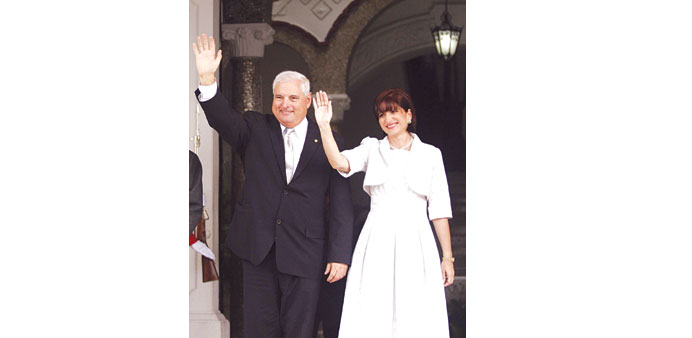DPA
Voters in Panama will head to the polls tomorrow to elect a successor to President Ricardo Martinelli.
Panamanian law bans immediate re-election of the president, but Martinelli, a wealthy businessman who turned to politics, is not keen on giving up power - so his wife is in the race instead.
Martinelli’s wife Marta Linares is the running-mate for ruling-party presidential candidate Jose Domingo Arias.
She is expected to convert support for her husband into a solid political base for his would-be successor in a race that appears to be very close.
Critics see an effort by Martinelli to continue to pull the strings in Panamanian politics after his term formally ends.
“It’s hard to argue that this scheme is healthy for Panama’s democracy,” said Michael Shifter, president of the Washington-based think tank Inter-American Dialogue.
In recent weeks Martinelli formally launched Central America’s first subway in Panama City.
The huge project, led by Construction Minister Arias, was timed to brace his candidacy. To make sure voters remember who to thank for such progress, the subway will be free for its first few months in operation.
“Of course, this has the opposition fuming,” government adviser Roberto Henriquez said with relish in a television interview.
“But dear sirs, I am sorry: the subway is a fact, and everyone is making use of it.”
Around 2.4mn Panamanians are registered and eligible to vote in tomorrow’s election to elect a new president and 71 legislators.
According to the latest opinion polls, Arias, of the ruling Cambio Democratico (Democratic Change) party, and Juan Carlos Varela, of the opposition Partido Panameñista (Party for Panama), are virtually tied.
Arias is expected to get 35% of the vote, with Varela taking 32%, according to a poll by the firm Dichter & Neira.
Beyond the two favourites, former Panama City mayor Juan Carlos Navarro is in the running with 30%. The four remaining candidates are not considered to be much of a factor, according to polls.
A simple majority is enough to reach the presidency in Panama, without a run-off.
Infrastructure and social inequality are the main issues in the election.
Although Panama’s economy grew by an average of 8% annually in recent years, social inequality remain significant in the Central American country, as the World Bank recently noted.
However, there is little real discussion about the substance of the country’s problems. “Most candidates do not talk about their programme, but simply make campaign promises,” said Maribel Jaen, head of the Justice and Peace Commission of the Roman Catholic church.
President Martinelli does not hide his support for Arias. Officially, the outgoing president cannot get involved in the campaign, but he allows advertisements to promote his administration’s achievements. “No government has ever done this much for the country and its people,” one television ad says.
Since Martinelli was inaugurated in 2009, his government has invested around $15bn in infrastructure. His administration carried out more projects in the past five years than all of his predecessors in the previous 50 years, the ruling party says.

